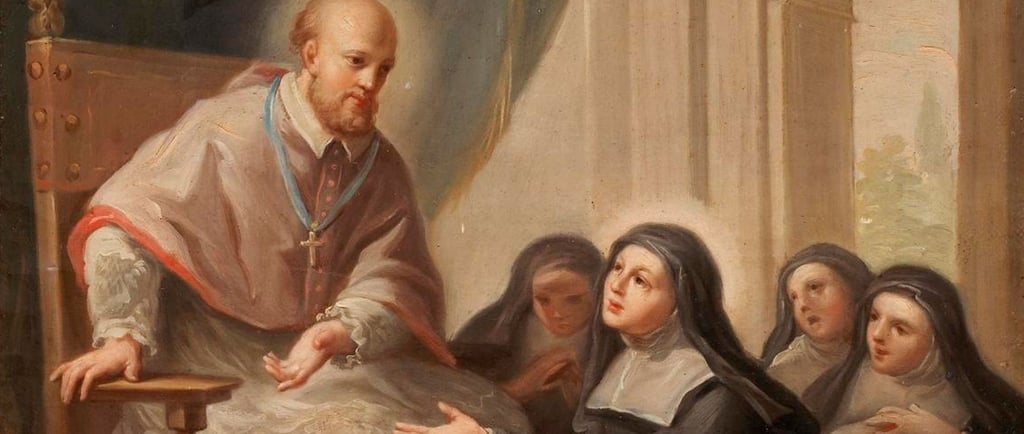St. Francis de Sales
St. Francis de Sales, a man whose very name echoes the harmony of love and faith, has been a beacon of spiritual light for centuries. Born on August 21, 1567, in the Duchy of Savoy, he was raised in a noble family yet was destined for profound humility and love. His journey, filled with trials and gifts, reminds us that holiness can be a path trodden by anyone desiring to grow closer to God.
SAINTS


Exploring the Life, Death, and Influence of St. Francis de Sales
St. Francis de Sales, a man whose very name echoes the harmony of love and faith, has been a beacon of spiritual light for centuries. Born on August 21, 1567, in the Duchy of Savoy, he was raised in a noble family yet was destined for profound humility and love. His journey, filled with trials and gifts, reminds us that holiness can be a path trodden by anyone desiring to grow closer to God. As we embark on this exploration of his life, death, and enduring influence, we shall also contemplate how he supports our prayer to the Blessed Sacrament.
The Early Life of St. Francis de Sales
Francis de Sales was raised in a family that valued faith and education. Initially destined for law, he instead felt a strong call to the priesthood. At the age of 26, after much internal struggle, he was ordained a priest. His journey toward becoming one of the Church's most beloved saints found its roots in his fervent longing to understand and share God's love.
The late 16th and early 17th centuries were times of upheaval for the Catholic Church, notably marked by the Protestant Reformation. Amidst this climate, Francis chose not to condemn those who strayed but to evangelize with love and understanding. His mission took him to the Geneva region, where Calvinism was rapidly gaining traction. St. Francis went into the heart of the Reform, seeking not to battle with rhetoric or anger but to foster a dialogue rooted in compassion.
A Champion of Gentle Persuasion
What set St. Francis de Sales apart was his unique approach to evangelization. Rather than using brute force, he embodied the virtue of gentleness that characterized Christ himself. His seminal work, "Introduction to the Devout Life," encourages souls to discover holiness amid their daily struggles, marrying the mundane with the divine.
In this book, he offered practical advice on prayer and spirituality, asserting that everyone—regardless of their state in life—could achieve holiness. From the layperson to the clergy, his message was clear: devotion does not exclude engagement with the world; the two can coexist beautifully.
Such understanding is particularly valuable in today's world, where distractions abound, and many consider spirituality detached from everyday life. St. Francis de Sales reminds us that the pathway to holiness is a mosaic of daily encounters with God's love and mercy.
The Death of St. Francis de Sales
St. Francis de Sales passed away on December 28, 1622, in Lyon, France. However, his legacy continued to flourish long after his physical presence departed. Canonized in 1665 by Pope Alexander VII, he was declared a Doctor of the Church in 1877. His writings remain a wellspring of inspiration, urging the faithful to pursue a life intertwined with prayer and the sacraments.
His death displayed the blend of humility and grace that characterized his entire life. On his deathbed, he continued to express love, even for those who had opposed him. This ability to forgive and love until the very end sums up his life’s mission—an unyielding commitment to manifest God’s love.
The Influence of St. Francis de Sales
Through his work, St. Francis de Sales has influenced the Church in profound ways. He played a pivotal role in the founding of the Visitation Order alongside St. Jane Frances de Chantal, which aimed to offer a sanctuary for women seeking a deeper spiritual life. The Order emphasized the beauty of devotion while allowing its members to embrace their inherent gifts as nurturers and caregivers.
Beyond founding orders, his teachings on prayer, especially in relation to the Blessed Sacrament, hold significant importance for contemporary Catholics. He fervently believed that regular reception of the Eucharist, coupled with heartfelt prayer, was essential for spiritual growth. His insights invite us to become ardent and devoted participants in the Mass, challenging us to deepen our relationship with Christ present in the Eucharist.
St. Francis’ approach to prayer was not solely transactional; it was about fostering a loving dialogue with God, nurturing an intimate relationship that opened the soul to grace. With the Blessed Sacrament at the center of Catholic worship, St. Francis serves as a gentle reminder that the heart of every believer ought to be oriented toward Christ's presence in the Eucharistic celebration.
A Reflection by Bishop Felix
As we consider the life and teachings of St. Francis de Sales, it is important to pause and reflect on his legacy before the Blessed Sacrament. Here lies Christ, present with us—intimately awaiting our attention, our love, and our devotion. Like St. Francis, we are called to approach Him with gentleness and trust. In today's fast-paced world, distractions often cloud our spiritual vision.
Let us remember that holiness does not require lofty aspirations or grand gestures but is found in the small acts of love and kindness we extend each day. St. Francis teaches us that our personal relationship with Jesus can flourish amidst ordinary tasks. Reflect on your own life; are you allowing Him to shine through you?
This self-inquiry calls us back to the heart of the Church—the Eucharist, which draws us into a deeper communion with God. Just as St. Francis de Sales did, embrace Him fervently in prayer, relish in His presence, and allow Him to fuel your desire for holiness.
Prayer to St. Francis de Sales
Dear St. Francis de Sales, in your gentle and loving spirit, we ask for your intercession as we strive to deepen our relationship with Christ, particularly in the Blessed Sacrament. Help us to cultivate a heart that is open to God’s grace, seeking holiness not just in word, but through action and love.
O patron saint of writers and journalists, inspire us to articulate our faith with clarity and compassion. May your devotion lead us to embrace every moment as an opportunity to encounter Christ and share His love with others in our lives.
We entrust to you, dear Saint, our intentions and the struggles of our hearts. Intercede before the Lord for our needs, so that we may fully participate in the life of the Church.
Amen.
Ancient Apostolic Catholic Church
Embracing faith, inclusion, and compassionate service together.
ST THOMAS AQUINAS SEMINARY
© 2025. All rights reserved
QUICK LINKS
